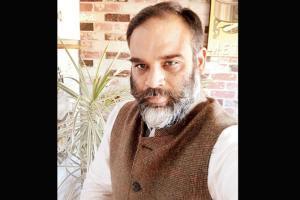Media studies professor Rohit Chopra, better known as @IndiaExplained, discusses how the Hindu Right is negotiating the Internet through his new book.

Rohit Chopra
Where interview subjects go, it has been a long journey with Rohit Chopra. Our first conversation was back in June 2014, when as the anonymous account @RushdieExplains, he became the toast of the Twitterati within a fortnight. His observations ranged from witnessing "Sushma Swaraj sipping tea from a samovar on the Volga" to "So honored to be keynoting 'Postcolonial Oversensitivity' conference at SOAS! Sponsored by B-Tex lotion!'"
ADVERTISEMENT
Sometime the next year, he unmasked himself, as a professor of media studies at California's Santa Clara University and later, at a request from the man himself, Salman Rushdie—when trolls directing their hatred towards both the real and the parody account became too strong a force—switched the account to @IndiaExplained. Within the year, Chopra too became a regular target of Hindu nationalist trolls for tweets that criticised the government and its policies.
"Even the mildest criticism of Modi or a joke triggers them [bhakts]," says Chopra, whose is out with his new book, The Virtual Hindu Rashtra, published by HarperCollins. He looks at the antecedents of nationalist rage on the Internet, and Chopra doesn't hold back. Just as he clearly says during this interview, "Mockery gets them. While Modi has instinctual political cunning, he has no domain expertise. He deliberately chooses not to surround himself with intelligent, competent people. Which is why someone like Dr Raghuram Rajan [former Governor of RBI] was not tenable."
When the interview took place, Chopra's Twitter account had been suspended because of comments he had made post the Hyderabad encounter. Criticising it, Chopra had argued that if people were to be killed on mere suspicion of assault, why should the same treatment not be meted out to those in power, for the allegations against them during the Gujarat riots. Twitter, says Chopra, blocked his account and asked him to delete the tweet. He deleted the tweet, then announced it on Twitter and then signed off, given the possibility that Twitter would close his account were he to repost the tweet. That is exactly what happened, though Twitter has since revoked the suspension.
"I am appalled that Twitter, both internationally and in India, is in bed with the authorities. Those who criticise them get direct death threats and if you are a women, rape threats. I got direct threats from an Indian in Seattle who said he'd kill me. But, Twitter did nothing, despite my reporting it." While the tentacles of nationalism and nationalist trolls have spread all over, Chopra says that India is in an especially precarious state. "We might be at par, if not marginally worse, than say Russia." And he says this is the global consensus. "In the US, say, if you confront a white nationalist or troll, they also hound and threaten you. But the critical difference is that the victim is given protection by the authorities even if Twitter does nothing. There, institutions of the state are not as thoroughly compromised as in India. So, trolls here are especially emboldened."
But, neither is the sentiment new nor is the usage of new media shocking. Chopra speaks of research done by Peter Manuel, assistant professor in the Department of Art, Music, and Philosophy at John Jay College (City University of New York), who in his book, Cassette Culture, Popular Music And Technology In North India, wrote of how Hindu right-wing activists would travel around sensitive neighbourhoods blaring audiotapes with the stereotypical narratives of Muslims as invaders. Chopra also speaks of how in the late 1990s, a column on rediff.com by Varsha Bhonsle on the murder of Australian missionary Graham Staines and his children, implying that "he had brought it upon himself" got comments that agreed with her. India's virulent nationalism had begun showing itself online back in the 1990s and early 2000s. "They did not find expression in mainstream media, but surfaced on the Net," says Chopra.
One suggestion Chopra has is that mainstream media support the countless liberal voices that exist, not just online but in small towns too. "The RTI activist in Bastar, the small-town journalist, the principal or teacher at town school. It's important to report their resistance to the establishment's views. When they don't get support from national media, it makes them more vulnerable."
Catch up on all the latest Mumbai news, crime news, current affairs, and also a complete guide on Mumbai from food to things to do and events across the city here. Also download the new mid-day Android and iOS apps to get latest updates
 Subscribe today by clicking the link and stay updated with the latest news!" Click here!
Subscribe today by clicking the link and stay updated with the latest news!" Click here!






